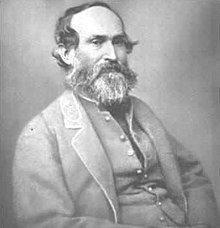Jubal Anderson Early
Jubal Anderson Early (born November 3, 1816 in Franklin County , Virginia , † March 2, 1894 in Lynchburg , Virginia) was an officer in the US Army , lieutenant general in the Confederate Army during the War of Civilizations and an attorney after the war. He was the most prominent representative of the Lost Cause .
Life
Early, who came from a long-established Virginia family, graduated from West Point Military Academy in 1837 as the 18th of his class. Before the American Civil War , he practiced as a lawyer. During the war he joined the Confederate Army on the side of his home state Virginia in 1861 , although he had previously been a member of the Secession Convention for the preservation of the Union. Early, who suffered from arthritis at the beginning of the war and looked older than his 44 years, proved to be a first-class commander, but on the other hand was also considered stubborn, belligerent and uncontrollable. As brigade and later division commander under "Stonewall" Jackson , he took part in the battles at Bull Run , on the Peninsula , Cedar Mountain , Antietam , Fredericksburg and Chancellorsville . At Gettysburg he led his division under Jackson's successor, Richard Stoddert Ewell . Shortly after the Battle of the Wilderness he was on behalf of the sick Ambrose Powell Hill with the leadership of the III. Corps of the Northern Virginia Army , which he commanded in the Battle of Spotsylvania Court House .
After Hill's recovery, Early returned to his division only briefly and a few days later took over permanent command of the II. Corps, whose previous commanding General Ewell had to give up his service in the field for health reasons. Linked to this was Early's early promotion to lieutenant general. He led the corps at the Battle of Cold Harbor and was then tasked with independent operations in the Shenandoah Valley that were intended to alarm the public in the Northern states and tie up enemy forces. He advanced along with a division under John C. Breckinridge and a total of less than 15,000 soldiers in July 1864 to the outskirts of Washington, DC , but was in the fall in the third Battle of Winchester and in the Battle of Cedar Creek by Philip Henry Sheridan decisively beaten. In both battles he initially proved to be tactically superior until the Union troops began to exploit their numerical superiority. His corps then returned to Lee's army at Petersburg , Virginia, under the command of General John Brown Gordon , while Early remained in the Shenandoah Valley with two infantry brigades. Here his last troops were crushed by George A. Custer on March 2, 1865 near Waynesboro , Virginia . Early himself was able to escape, but was relieved of his command by Lee on March 30th, which Lee justified with pressure from the public and not with a lack of confidence in Early's abilities.
After the defeat of the southern states, he fled to Canada via Mexico and Cuba . In 1868 he was pardoned by President Andrew Johnson and returned to his homeland in 1869, but without swearing the oath to the Union. He was regarded as one of the most prominent representatives of the Lost Cause , and tried incessantly to justify secession and, above all, the struggle of the South for its independence in books and speeches. In this context he participated on the one hand in various attempts to glorify the now deceased Robert Edward Lee , while on the other hand he tried to defame a number of former officer comrades, whom he blamed for the defeat.
Works
- A memoir of the last year of the war for independence in the confederate states of America [microform : containing an account of the operations of his commands in the years 1864 and 1865] Published 1866.
- The campaigns of Gen. Robert E. Lee . 2nd revised edition. Publisher: J. Murphy & co. Baltimore, 1872
- Address to the Southern Historical Convention by General Jubal A. Early in: The proceedings of the Southern historical convention at the Montgomery White Sulfur Springs, Va., On the 14th of August, 1873; and of the Southern historical society as reorganized. Publisher Turnbull brothers Baltimore, 1873
- Lieutenant General Jubal Anderson Early, CSA: Autobiographical sketch and narrative of the War between the States. With Notes by Ruth Hairston Early . Publisher: JB Lippincott Company London and Philadelphia; Published 1912
- The heritage of the South; a history of the introduction of slavery; its establishment from colonial times and final effect upon the politics of the United States . by Jubal A. Early and Ruth Hairston Early. Publisher: Press of Brown-Morrison Co. Lynchburg, Va., C1915
- Publication by and about Jubal A. Early in Internet Archive (online)
literature
- Charles C. Osborne: Jubal: The Life and Times of General Jubal A. Early, CSA, Defender of the Lost Cause . Chapel Hill, NC 1992.
See also
Web links
- Jubal Anderson Early in the database of Find a Grave (English)
| personal data | |
|---|---|
| SURNAME | Early, Jubal Anderson |
| BRIEF DESCRIPTION | American general |
| DATE OF BIRTH | November 3, 1816 |
| PLACE OF BIRTH | Franklin County |
| DATE OF DEATH | March 2, 1894 |
| Place of death | Lynchburg |

